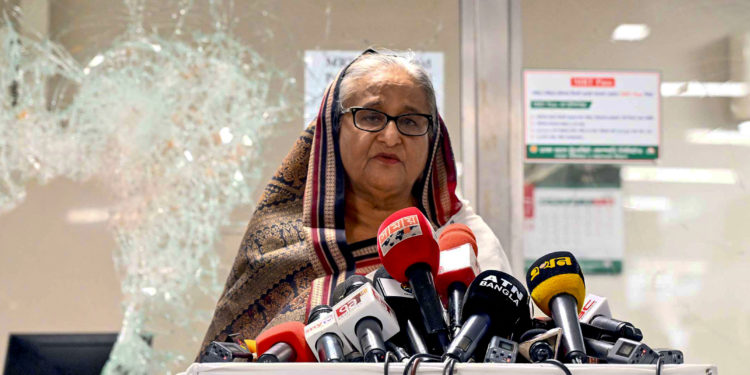Sheikh Hasina’s 15-year tenure as Prime Minister of Bangladesh came to a dramatic end on Monday, following her escape amid escalating violence and widespread protests. The military has announced the formation of an interim government in response to the crisis.
Efforts by Hasina to quell nationwide unrest that began in early July proved futile, culminating in a violent day of protests on Sunday, which resulted in nearly 100 fatalities. In a televised address, General Waker-Uz-Zaman, the Chief of Army Staff, declared that Hasina had resigned and that the military would assume control to restore order.
“The nation has endured immense suffering, and the economy has been severely impacted,” General Waker stated, clad in military fatigues. “It is imperative that we end the violence.”
Waker, a seasoned infantryman, has indicated plans to consult with the President to establish a caretaker administration. Whether he will personally lead this interim government remains uncertain.
The general’s address followed Hasina’s dramatic exit from the country. Sources close to the Prime Minister revealed she initially attempted to escape by motorcade before eventually departing by helicopter. Her current location remains undisclosed.
In the early hours of Monday, jubilant crowds took to the streets, celebrating the fall of Hasina’s regime. Images broadcast by Channel 24 showed protesters storming the Prime Minister’s residence, engaging in looting, and defacing a statue of Sheikh Mujibur Rahman, Bangladesh’s revered independence leader.
Michael Kugelman, Director of the South Asia Institute at the Wilson Center, cautioned that Hasina’s departure could create significant instability. “The impact of this transition depends on its nature,” Kugelman remarked. “A peaceful shift to an interim government could minimize risks, but a violent or uncertain transition could exacerbate instability.”
Hasina’s son, Sajeeb Wazed Joy, had earlier urged security forces to prevent any unauthorized government takeover. “It is your duty to ensure that no unelected government assumes power,” he posted on Facebook.
The violent demonstrations that escalated on Sunday claimed at least 94 lives, including 14 police officers. This marks the deadliest day of unrest since protests erupted in early July, initially sparked by contentious civil service job quotas and expanding into broader demands for Hasina’s resignation.
Protesters clashed with security forces, who responded with live ammunition. The death toll since the beginning of the unrest has now surpassed 300, according to AFP’s compilation from various sources.
In January 2007, a military-backed caretaker government was installed following extensive political turmoil. Hasina’s administration, which began in 2009, was re-elected for a fourth consecutive term in January, following a contentious vote that was criticized for lacking genuine opposition.
Hasina’s government faced accusations of manipulating state institutions to suppress dissent, including extrajudicial killings of opposition activists. The recent protests were ignited by the reintroduction of a quota system for government jobs, which had been previously curtailed by the judiciary.
Despite barricades and heightened security around Hasina’s office, vast numbers of protesters breached the barriers, with estimates suggesting up to 400,000 demonstrators. The Business Standard newspaper reported these figures, though verification remains challenging.
Asif Mahmud, a prominent figure in the civil disobedience movement, declared, “The time has come for the final protest.”
In contrast to previous responses, soldiers and police refrained from intervening in Sunday’s protests. Former Army Chief General Ikbal Karim Bhuiyan had earlier criticized the government for its handling of the unrest, calling for the immediate withdrawal of troops and a more permissive stance on protests.
“The individuals responsible for driving this country to such extreme distress must face justice,” Bhuiyan asserted.
















